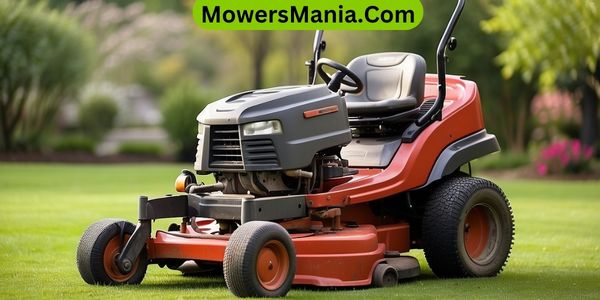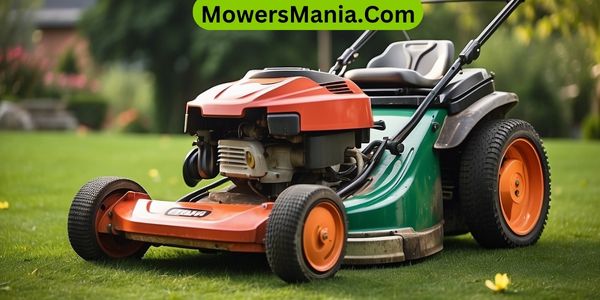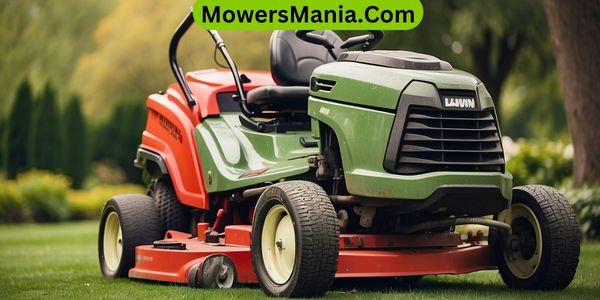Wondering how long your lawn mower will last? With proper care, it can serve you for many years.
Regular maintenance and choosing the right type of mower are key factors in extending its lifespan. Keep an eye out for signs of wear and tear, and follow our expert tips to ensure your mower stays in top condition.

Let’s dive into the factors that affect the longevity of your trusty lawn mower.
Factors Affecting Longevity
To maximize the lifespan of your lawn mower, there are several important factors to consider:
- Routine maintenance tasks: Regularly performing tasks such as changing the oil and replacing the air filter is essential. Neglecting these tasks can significantly reduce the longevity of your mower.
- Fuel quality: The type of fuel used can impact the lifespan of your machine. Using old or contaminated fuel can lead to clogs and engine issues, so it’s important to use fresh, clean gasoline.
- Frequency and intensity of use: The frequency and intensity of use plays a role in how long your lawn mower will last. Overworking the machine or using it in extreme conditions can wear it out more quickly.
- Quality of the mower: It’s crucial to consider the quality of the mower itself. Investing in a high-quality, durable mower can prolong its lifespan.
- Environmental factors: Environmental factors such as exposure to moisture, sunlight, and extreme temperatures can also affect the longevity of your lawn mower.
Regular Maintenance Tips
Perform routine maintenance tasks such as changing the oil and replacing the air filter to ensure the longevity of your lawn mower. Regular maintenance not only extends the life of your mower but also ensures optimal performance.
Here are some essential maintenance tips to keep your lawn mower running smoothly:
- Oil Change and Filter Replacement:
- Change the oil at the beginning of each mowing season or after every 25 hours of use.
- Replace the air filter annually or more frequently if you mow in dusty conditions.
- Spark Plug Care:
- Check and clean or replace the spark plug yearly to maintain proper ignition.
By following these maintenance tips, you can significantly prolong the lifespan of your lawn mower. Additionally, a well-maintained mower will provide better cutting performance and fuel efficiency.
Types of Lawn Mowers

To ensure the longevity of your lawn mower, considering the types of lawn mowers available is crucial for making an informed choice that fits your specific needs. There are several types of lawn mowers, each designed for different lawn sizes and terrain.
Here’s a comparison of the most common types:
| Type | Description | Best For |
|---|---|---|
| Push Reel Mower | Manual operation, eco-friendly, quiet, good for small lawns | Small, flat lawns |
| Gas Lawn Mower | Powered by gasoline, self-propelled options available | Medium to large lawns, uneven terrain |
| Electric Lawn Mower | Corded or cordless, low maintenance, quieter than gas mowers | Small to medium lawns, flat terrain |
Understanding the differences between these types of lawn mowers will help you select the best option for your lawn.
Consider factors such as lawn size, terrain, and personal preference when making your decision. By choosing the right type of lawn mower, you can ensure that it meets your specific needs and lasts for years to come.
Signs of Wear and Tear
If your lawn mower starts showing signs of wear and tear, it’s important to address these issues promptly to maintain its longevity. Regular maintenance and timely repairs can significantly extend the lifespan of your lawn mower.
Here are some key signs to watch out for:
- Decreased Performance
If you notice that your lawn mower is struggling to cut grass as efficiently as it used to, it could be a sign of wear and tear. This may be due to a dull blade, engine issues, or other mechanical problems.
- Excessive Vibration
Excessive vibration during operation can indicate worn-out or imbalanced components. Ignoring this issue can lead to further damage and reduce the overall lifespan of your lawn mower.
By being attentive to these signs and addressing them promptly, you can prevent minor problems from escalating into major issues that could potentially shorten the life of your lawn mower.
Regularly inspecting and maintaining your equipment will ensure that it continues to operate at its best for years to come.
Extending Lifespan Through Care

To extend the lifespan of your lawn mower, regular maintenance and timely repairs are crucial.
Start by checking the oil levels, air filters, and spark plugs regularly. Change the oil and air filter as recommended by the manufacturer, usually once a year.
Keep the mower blades sharp to prevent tearing the grass, which can lead to disease and pests. After each use, clean the underside of the mower deck to remove grass clippings and debris.
Inspect the drive belts and replace them if they’re worn or cracked. Additionally, keep an eye on the wheels, ensuring they turn smoothly and are properly lubricated.
When it comes to timely repairs, address any issues immediately. Ignoring strange noises, vibrations, or difficulty starting can lead to more extensive damage. If you’re not confident in your ability to make repairs, take your mower to a professional for servicing.
Lastly, store your lawn mower properly during the off-season. Clean the mower thoroughly, remove the battery, and store it in a dry, sheltered place.
Frequently Asked Questions (FAQs)
Can a Lawn Mower Be Used on Wet Grass Without Affecting Its Lifespan?
You can use a lawn mower on wet grass, but it may affect its lifespan. Wet grass can lead to corrosion and rust. It’s best to avoid mowing wet grass if possible to keep your mower in good condition.
Is It Better to Store a Lawn Mower Indoors or Outdoors When Not in Use?
It’s better to store your lawn mower indoors when not in use. This helps protect it from the elements and extends its lifespan. Outdoor storage exposes it to moisture, rust, and other damage.
What Is the Average Lifespan of a Battery-Powered Lawn Mower Compared to a Gas-Powered One?
On average, a battery-powered lawn mower typically lasts about 5-7 years, while a gas-powered one can last 8-10 years with proper maintenance. Consider your usage and maintenance habits when choosing between the two options.
Are There Any Specific Parts of a Lawn Mower That Are More Prone to Wear and Tear, and How Can They Be Maintained to Extend the Mower’s Lifespan?
To extend your lawn mower’s lifespan, focus on maintaining parts prone to wear and tear. Regularly clean the air filter, sharpen the blades, and change the oil. Check for loose or worn-out components and replace them promptly.
How Do Different Types of Grass and Terrain Affect the Lifespan of a Lawn Mower?
Different types of grass and terrain can impact your mower’s lifespan. Thick or tall grass and uneven terrain may strain the engine and blades, leading to quicker wear. Regular maintenance and proper usage can help extend its life.
Conclusion
So, in conclusion, taking good care of your lawn mower and keeping up with regular maintenance can greatly extend its lifespan.
Factors like the type of mower and how often it’s used also play a role in how long it will last.
By paying attention to signs of wear and tear and addressing them promptly, you can ensure that your lawn mower stays in good working condition for as long as possible.



